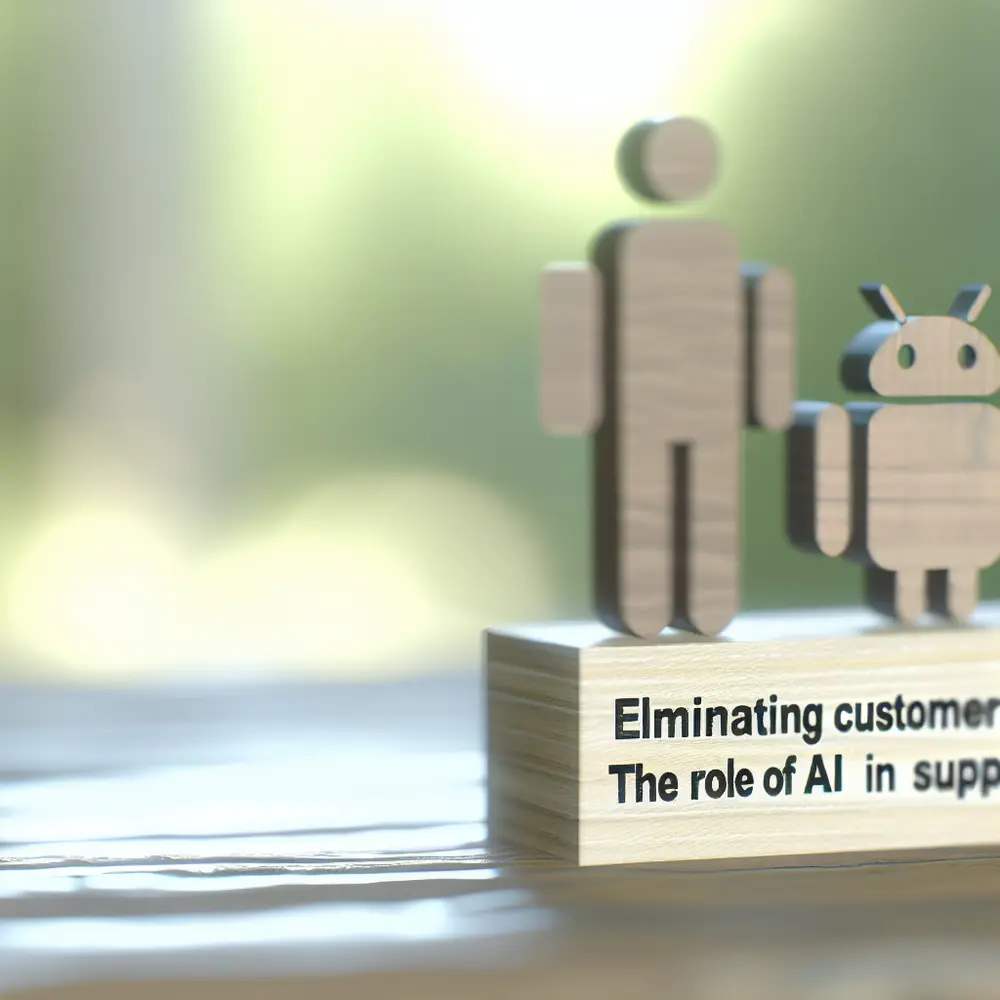Are you struggling to enhance customer satisfaction due to long waiting times? In today’s fast-paced market, quick and efficient customer service is non-negotiable. Businesses must tackle waiting times head-on to maintain a competitive edge and support a demanding customer base effectively.
Integrating AI technologies presents a transformative solution for managing and eliminating these delays. AI-driven support systems offer instant responses, allowing businesses to improve their service quality without overextending their human resources.
This article will explore how AI can revolutionize customer service by eliminating waiting times, enhancing overall customer experience, and detailing practical implementations through case studies.
The Transformation of Customer Service with AI

“By integrating AI support, we’ve seen a drastic improvement in customer satisfaction and response times.” – Maria, Customer Service Manager at Clínica Vitalis
You can drastically enhance customer satisfaction by integrating AI support into customer service operations. By adopting AI technologies, such as chatbots and intelligent virtual assistants, you reduce response times and ensure customers receive immediate assistance. This innovation is essential for maintaining your business’s competitive advantage.
- Clínica Vitalis: Adopted AI chatbots for handling appointment inquiries and after-hours support, resulting in a 50% decrease in customer waiting time.
- Transportadora Prime: Analyzed past interactions with AI technologies, leading to a 30% reduction in waiting times.
AI-driven solutions streamline interactions by automating routine inquiries, allowing human agents to focus on complex issues. This approach not only boosts service efficiency but also enhances customer experiences through timely responses.
Implementing AI empowers predictive engagement by analyzing customer data to foresee their needs. Operational improvements arise as AI automates ticket routing, ensuring inquiries promptly reach the right department. This enhancement enables customer service teams to respond more quickly, keeping productivity levels high.
“AI has allowed us to make data-driven decisions that significantly improve our customer service strategies.” – John, Customer Service Analyst
Real-time tracking of performance metrics helps businesses constantly refine their strategies. With AI systems measuring response times and customer satisfaction rates, customer service managers can make data-driven decisions for enhanced service.
The Impact of Waiting Times on Customer Experience

“The frustration caused by long wait times can overshadow even the best services; we had to act quickly to improve.” – Sarah, Operations Lead at DaJu Online Store
You should recognize how waiting times significantly influence customers’ perceptions of your brand. Prolonged delays can lead to frustration, diminishing overall satisfaction. Overcoming these inefficiencies is critical for retaining customer loyalty.
By employing AI technologies, such as automated chatbots, you provide instant responses to inquiries, thereby accelerating engagement. As a result, companies see substantial improvements in customer experience.
- DaJu Online Store: Cut its waiting times by 15% using intelligent virtual agents during peak shopping periods.
- Market data from Datafolha indicates that businesses leveraging AI-driven support report up to a 40% increase in customer retention rates, clearly demonstrating the connection between speed and loyalty.
Moreover, round-the-clock AI assistance allows you to offer aid beyond conventional hours, establishing a reputation for reliability. Customers feel valued and respected when they receive prompt responses, positively influencing brand perception.
The Impact of AI on Reducing Waiting Times

“Automation has transformed our service delivery, significantly eliminating waiting times altogether.” – Emily, CTO at Receitas Simples
A pivotal benefit of AI-driven support solutions lies in their capacity to eliminate waiting times. Think about how automation transforms your customer service by addressing inquiries swiftly and efficiently, thus enhancing your overall effectiveness.
Automation Enhances Speed in Customer Interactions
By providing instant responses, AI allows customer service teams to resolve queries promptly. Receitas Simples integrated AI chatbots into their support channels, achieving a 70% reduction in average response times and freeing agents to tackle intricate cases.
Streamlined Ticket Management Processes
AI improves ticket management by categorizing requests based on complexity and urgency. A travel agency implemented intelligent ticket management systems, which facilitated a 40% reduction in resolved waiting times and increased service efficiency overall.
Predictive Analytics for Proactive Support
With predictive analytics, AI can forecast customer needs, addressing potential issues proactively. The integration of these solutions has helped businesses like Serenity Hotels anticipate customer inquiries, resulting in a 25% reduction in waiting times.
Personalized Customer Experiences
Using AI to analyze extensive customer data enables businesses to tailor responses effectively. By understanding individual preferences, organizations can prioritize issues swiftly and enhance customer engagement.
Integrating AI with Omnichannel Platforms
When you integrate AI solutions with omnichannel service platforms, customer experiences become more cohesive. AI-driven channels ensure seamless transitions and consistent support quality, effectively aiding in reducing wait times.
AI-Powered Solutions for Customer Support

“Our customers love the instant responses we can provide now, it’s been a game-changer for us.” – Leo, COO at GuiaFit
Integrating AI into support solutions revolutionizes the way businesses manage customer inquiries. By enhancing both speed and efficiency, you can significantly eliminate waiting times and enhance service quality.
AI chatbots act as the frontline for customer interactions. For example, after deploying an AI system, GuiaFit saw an 80% decrease in waiting times for their health-related inquiries, resulting in a surge in customer satisfaction levels.
Furthermore, utilizing AI systems for personalized experiences minimizes response delays. Historical data analysis enables you to offer immediate solutions, fostering deeper customer connections.
Moreover, switching from chatbots to human agents is seamless when AI maintains conversation context. This integration ensures that valuable information remains accessible throughout customer interactions, helping further reduce wait times.
Also, AI can help predict busy hours and optimize staff allocation accordingly. Businesses can better utilize resources, enhancing support efficiency during peak periods and ultimately improving customer experiences.
Case Studies: Companies Improving Response Times with AI

- Telecommunications Company: Integrated an AI-powered chatbot, achieving a 60% reduction in average response times.
- E-Commerce Platform: Adopted AI-driven virtual assistants to manage high volumes of inquiries, resulting in a 50% decrease in customer wait times.
- Global Airline: Transformed customer support by proactively utilizing AI, leading to a significant 30% increase in customer loyalty.
- Financial Services: Enhanced support channels using AI, substantially reducing wait times.
- Predictive Analysis in Telecommunications: Employed predictive analytics to optimize support strategies and eliminate waiting times.
Challenges in Implementing AI in Customer Support

“The road to integrating AI is filled with challenges, but the benefits greatly outweigh them.” – Tom, IT Director
To harness the full potential of AI, businesses must navigate several challenges. One major hurdle is ensuring data quality to prevent misleading insights, which necessitate frequent data validation processes.
Balancing Automation and Human Interaction
Maintaining a balance between automated responses and human interaction is essential. A hybrid model utilizing AI chatbots alongside live agents can provide both speed and personalization.
Integration with Existing Systems
Seamless integration with legacy systems can pose challenges. Ensuring your AI tools fit harmoniously with existing platforms is vital for streamlining support and maximizing efficiency.
Employee Training and Adaptation
Effective training is crucial for equipping staff with necessary AI tool knowledge and interpreting insights accurately. Training programs can also reinforce service quality and maintain customer engagement.
Monitoring and Fine-Tuning AI Solutions
Continuous monitoring and adjustment of AI systems optimize performance. Analyzing interactions reveals critical insights, helping refine strategies to uphold service quality and expediency.
The Transformative Impact of AI Support

“After implementing AI support, we saw a 40% jump in resolution rates and happier customers.” – Alice, Customer Experience Officer at Centro de Apoio ao Consumidor
Implementing AI support is essential for enhancing customer service and eliminating waiting times. By successfully employing automation into your strategies, you foster greater efficiency and drive customer satisfaction.
AI streamlines ticket processes and efficiently directs routine inquiries to automated systems, allowing agents to focus on complex cases. Real-time customer engagement fosters continuous improvement. By analyzing user interactions, companies can adapt services proactively, reducing potential wait times before they arise.
Using an omnichannel service platform in conjunction with AI ensures consistent customer interactions across all channels. This cohesive approach not only enhances efficiency but also reinforces customer loyalty.
By embracing AI in customer support, you don’t just meet today’s expectations—you navigate the future of customer engagement effectively. For organizations eager to transform customer service, consider exploring an omnichannel service platform for optimal results.









